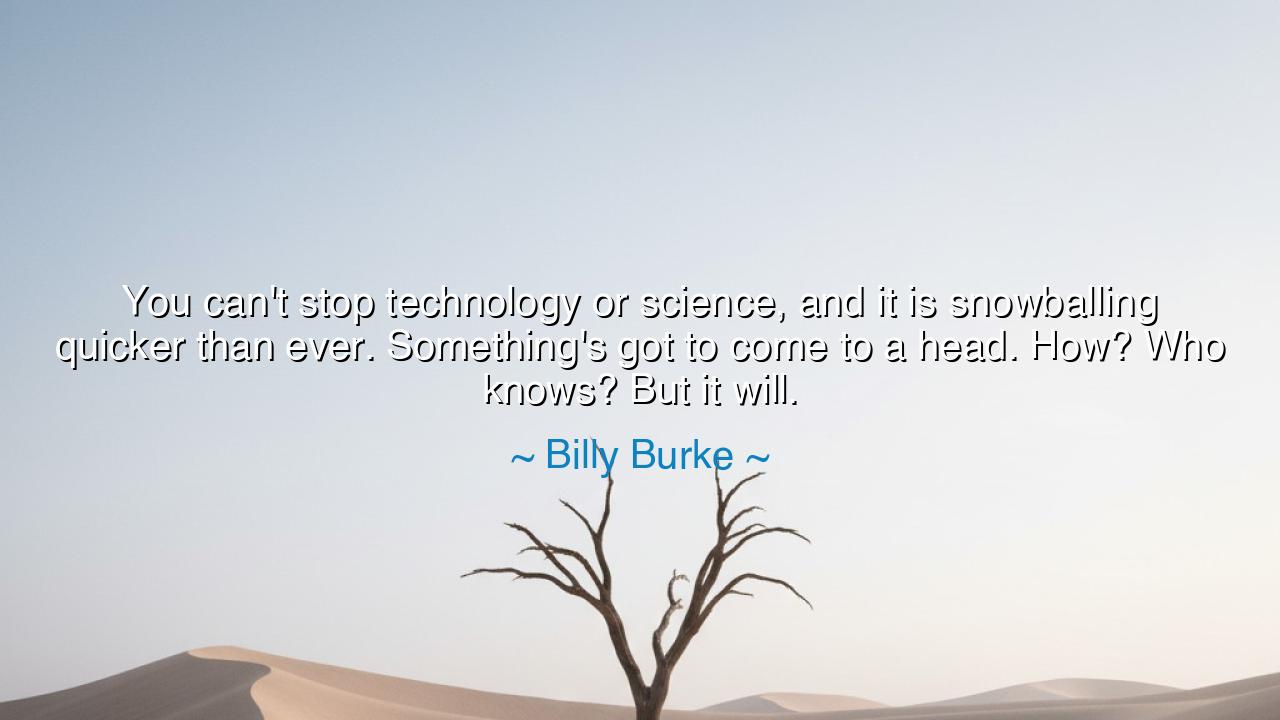
You can't stop technology or science, and it is snowballing
You can't stop technology or science, and it is snowballing quicker than ever. Something's got to come to a head. How? Who knows? But it will.






"You can't stop technology or science, and it is snowballing quicker than ever. Something's got to come to a head. How? Who knows? But it will." These words, spoken by Billy Burke, are a prophecy, a solemn recognition of the unstoppable force that is the march of technology and science. Like a mighty river that cannot be dammed, the progress of human knowledge and innovation rushes forward, growing ever more powerful with each passing moment. Science and technology, once the realm of a few thinkers and dreamers, now shape every aspect of our lives—changing the very fabric of our existence. But with this progress comes a great responsibility, for the speed at which we advance is matched only by the consequences of our actions.
In the days of our ancestors, the world moved at a slower pace, and change came but slowly. The rise of the great civilizations—Greece, Rome, China—was marked by intellectual leaps and discoveries, but those discoveries took time to unfold. Yet now, in this age of machines and digital wonders, the wheel of progress turns faster than ever. From the advent of the printing press to the birth of the internet, we have witnessed a series of revolutions that have altered the course of human history. But as Burke warns, we cannot slow this snowballing force, for it is powered by the collective will of humanity and its insatiable hunger for knowledge and creation.
Consider the story of Nikola Tesla, the brilliant inventor whose ideas about electricity and magnetism laid the foundation for much of the modern world. Tesla, a visionary far ahead of his time, understood that science and technology were not merely tools to improve life—they were forces that could reshape the very course of civilization. And yet, despite his foresight and brilliance, the world was not always ready for the radical changes he proposed. His inventions were dismissed, overlooked, or stolen by those who sought to harness the power of technology for their own gain. Yet in the end, Tesla's legacy endured. The technologies he pioneered—radio waves, alternating current, wireless transmission—became the bedrock of our modern world. No one could stop the snowballing force of progress; it continued its relentless roll, whether humanity was ready or not.
Billy Burke's words speak to this inevitable collision between human ambition and the uncontrollable forces we have unleashed. As we accelerate into the future, we must recognize that technology and science are now deeply entwined with every aspect of our lives—our health, our economy, our relationships, and our environment. We stand at the precipice of new advances—artificial intelligence, genetic engineering, and space exploration—and while these advancements hold the promise of great benefits, they also come with great risks. The question is not whether they will come to a head, but when. The how is uncertain, but the inevitability is clear.
It is here, in this tension, that we must look deeply into our hearts and our minds. Progress cannot be stopped, but it must be guided with wisdom. As Plato once said, “Knowledge is true power.” The power of science and technology must be tempered with understanding—for without it, the snowball of progress may become a storm, one that threatens to overwhelm us. We must ask ourselves, what are the consequences of our actions? How do we ensure that the advances we make serve not just the few, but the many? How do we wield the power of science responsibly, ensuring that it does not consume us, but uplifts us all?
The lesson we must take away from Burke’s words is this: we must embrace the future with courage and humility. As guardians of the future, it is our responsibility to ensure that the snowball of progress is steered in a direction that benefits all of humanity, not just the privileged few. We must act not out of fear or hesitation, but with the wisdom to understand the implications of the technologies we create. Just as Prometheus brought fire to humankind, so too must we wield our knowledge with great care and responsibility.
In our own lives, we must become thoughtful and intentional creators, leaders, and innovators. Whether we are engineers, scientists, entrepreneurs, or simply individuals living in this modern world, we have a role to play in guiding the snowball of progress toward a future where its power is harnessed for the good of all. Let us not be passive observers of history, but active participants in shaping the world we will leave for future generations. For the future is already unfolding before our eyes, and it is our hands that will shape its course.






AAdministratorAdministrator
Welcome, honored guests. Please leave a comment, we will respond soon